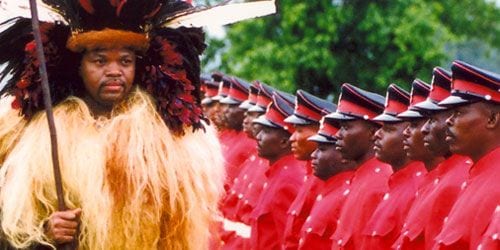
Swaziland is African’s only remaining monarchy, and its King has selected each of his 13 wives after they have paraded before him, along with 75,000 other virgins — all wearing a traditional Swazi skirt, necklace and headdress, and little else — during the country’s annual Reed Dance.
Using the same strategy of swift, appearance-based decision-making, the documentary film Without the King, which introduces us to King Mswati III and his family, seems worthy of committing 84-minutes of your time. It was screened at the respected Full Frame Documentary Film Festival in Durham, North Carolina, and won a special jury prize at the 2008 Hot Doc International Film Festival in Toronto.
It has the hallmarks of an engaging documentary — a quirky topic you might never otherwise learn about, combined with the potential to leverage this topic to explore broader social issues, like whether a leader’s personal life affects his or her ability to rule and how to resolve the tension between traditional African culture and the modern values of a predominantly democratic world.
Despite its surface promise, however, this film fails to draw you in. Most of it is spent following Princess Pashu, the daughter of the King’s first wife, as she prances around the palace and her own beauty parlor. Imagine a chatty, self-absorbed royal teenager, and you have Princess Pashu.
An early scene features the Princess rapping — a full-length video is one of the DVD’s extras — and the only surprise here is that she is actually not too bad. The Princess goes off to a university in California, and her introduction to the world outside of Swaziland makes her increasingly skeptical about her father’s leadership. She is especially concerned about his lack of attention to the population’s poverty and the way his polygamy promotes behavior that directly contradicts the country’s effort to reduce its world’s-highest rate of HIV infection.
The Princess returns home, visits an orphanage wearing high-heeled shoes and sporting a pink handbag, and hugs some children. The film closes with her saying that “it is high time we did something” to bring hope to the people.
The most interesting character in the film is the Princess’ mother, Queen LaMbikiza. She tells an engaging story about becoming the Queen and dealing with the King’s acquisition of 12 additional wives. Her description of how she views her role is articulate, honest and gripping. It is only a few minutes of the film, but you can check out an additional five-minute interview in the extras.
The documentary’s sub-plot follows a raggedy band of activists who want the Kingdom to become a democracy. While you admire their commitment and courage, they lack a charismatic leader, and the storyline does not create any tension. Though the King does make a token concession to democracy by approving a new constitution, you never actually believe his leadership is under threat. The activists have a lot more work to do. Maybe in five years this story will be one to follow.
The most painful part of the film is a hit-you-over-the-head scene which skims over a handful of recent wars in Africa, while trying to make the point that at least Swaziland, despite its many problems, has not suffered the same fate. If the alternative is brutal civil war, then perhaps being Africa’s last monarchy is not such a bad thing, after all? The scene needlessly feeds into the stereotype of Africa as one big, machete-wielding war zone.
Without the King is produced and directed by 30-year old Michael Skolnik, who was introduced to the Royal Family through his Zulu professor at UCLA. Skolnik intended to create a documentary focused solely on the family itself. Then, during filming, he was contacted by the democracy activists, who offered to show him the “real” Swaziland. Given the lack of political freedom in Swaziland, it was a brave decision for Skolnik to film the activists, and for the activist to accept this risk.
Skolnik previously produced and co-directed On the Outs, a well-regarded 2004 documentary that follows three young women — a drug dealer, an addict, and a pregnant teen — who live in Jersey City. He is currently in post-production with Cry Haiti, a documentary he co-wrote and co-directed, that chronicles Wyclef Jean’s efforts to bring peace and humanitarian aid to his homeland.
Skolnik has a knack for finding interesting topics to explore. In Without the King, it is the characters themselves who let him down.

![Call for Papers: All Things Reconsidered [MUSIC] May-August 2024](https://www.popmatters.com/wp-content/uploads/2024/04/all-things-reconsidered-call-music-may-2024-720x380.jpg)



